The stakes are excessive for Primož Roglič on this 12 months’s Vuelta a España. The Slovenian arrives on the race after fracturing his again in a crash on the Tour de France, and the ache from his heavy fall in July nonetheless lingers.
Purely by way of information, a fourth general victory would put the 34-year-old on a stage footing with essentially the most profitable ever Vuelta rider Roberto Heras, who gained his residence Grand Tour in 2000, 2003, 2004 and 2005.
Nevertheless, Grand Tour success hardly ever comes simply to Roglič, and a triumph within the 2024 Vuelta can be no exception to that rule. Nobody doubts the previous ski jumper’s enormous expertise on two wheels. However there are many query marks surrounding the Pink Bull-Bora-Hansgrohe chief’s capacity to carry out at his most following his Tour damage.
But at the least till occasions on the highway show in any other case – and Saturday’s opening time trial will present the primary actual clue concerning his situation – Roglič stays the important thing reference level for all of the Vuelta contenders for now.
With that in thoughts, Cyclingnews has run the rule over Roglič’s pathway to being essentially the most profitable Vuelta a Esapaña rider within the present peloton – and why, after Roglič’s victories in Spain in 2019, 2020 and 2021, Tadej Pogačar may not be the one Slovenian making Grand Tour historical past in 2024.
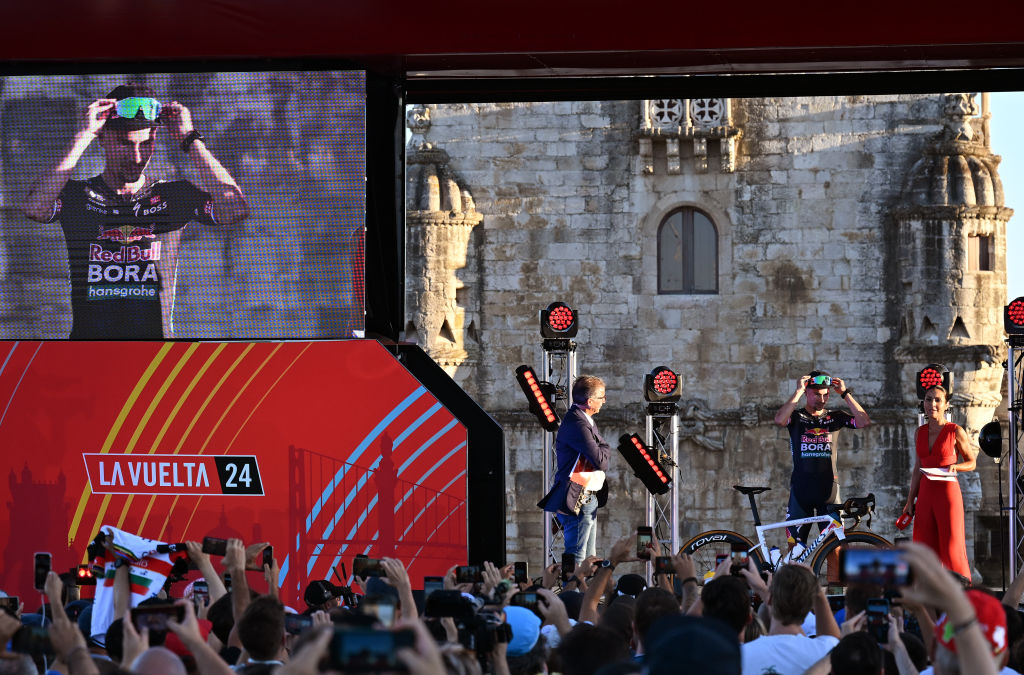
2019: A breakthrough win
When Cyclingnews interviewed Primoz Roglič a couple of days earlier than the beginning of the 2019 Vuelta a España, sitting on a barstool within the sweltering scorching faculty classroom that had been roped in by the organisation for pre-race chats, Roglič proved an much more laconic interviewee than normal.
However it was notable, too, that after a fourth place within the Tour in 2018 and a runner’s up spot within the 2019 Giro d’Italia, Roglic didn’t beat across the bush about his objectives for his first ever Spanish Grand Tour. Positive, the man may need been perched on a barstool when he talked: however he definitely wasn’t within the temper for any sort of pub banter.
The newest race content material, interviews, options, opinions and knowledgeable shopping for guides, direct to your inbox!
“I need to win and I’ll attempt to win,” Roglič, down as a co-leader for the Vuelta a España that 12 months alongside teammates George Bennett and Steven Kruisjwijk: stated categorically and easily when requested about his objectives.
“The rostrum is a pleasant place, however I’ve already achieved that on the Giro. I need to battle as onerous as potential to win.” Nevertheless, he performed down the concept he was the highest favorite for outright victory in 2019, merely saying: “All people begins from zero on Saturday.”
In Jumbo-Visma’s case, actually, Roglič’s then-team barely began the 2019 Vuelta’s opening TTT earlier than they discovered themselves heading to someplace lower than zero. Seemingly inconsequential by way of its quick distance via the streets of Torrevieja, midway via the time trial no fewer than 4 of their riders have been introduced down by water gushing downhill, from – of all issues – a burst youngsters’s paddling pool located a full 500 metres away.
The thriller of fairly how such a small pool might wreak such liquid mayhem was by no means resolved. However in any case, the impact of the water spillage was what it was: Roglič and nominal co-leader Kruijswijk have been two of the 4 riders to fall, alongside Neilson Powless and Lennard Hofstede. Though no person was significantly injured, the entire group misplaced 40 seconds to winners Astana in consequence.
‘How I misplaced the Vuelta due to a leaking paddling pool’ would have made for an attention-grabbing chapter title in any future hypothetical biography for Roglič. However actually, the Slovenian subsequently managed to regular the ship in type with a relentless rise in direction of the higher reaches of the Vuelta GC.
Sixth place within the summit end within the distant astronomy statement put up at Javalambre, second within the ultra-steep Mas de la Costa inland in Valencia, and above all third place on the crunch, hail-lashed, Andorra stage of Cortals d’Encamp noticed Roglič transfer into second general behind Nairo Quintana by the Vuelta’s first relaxation day.
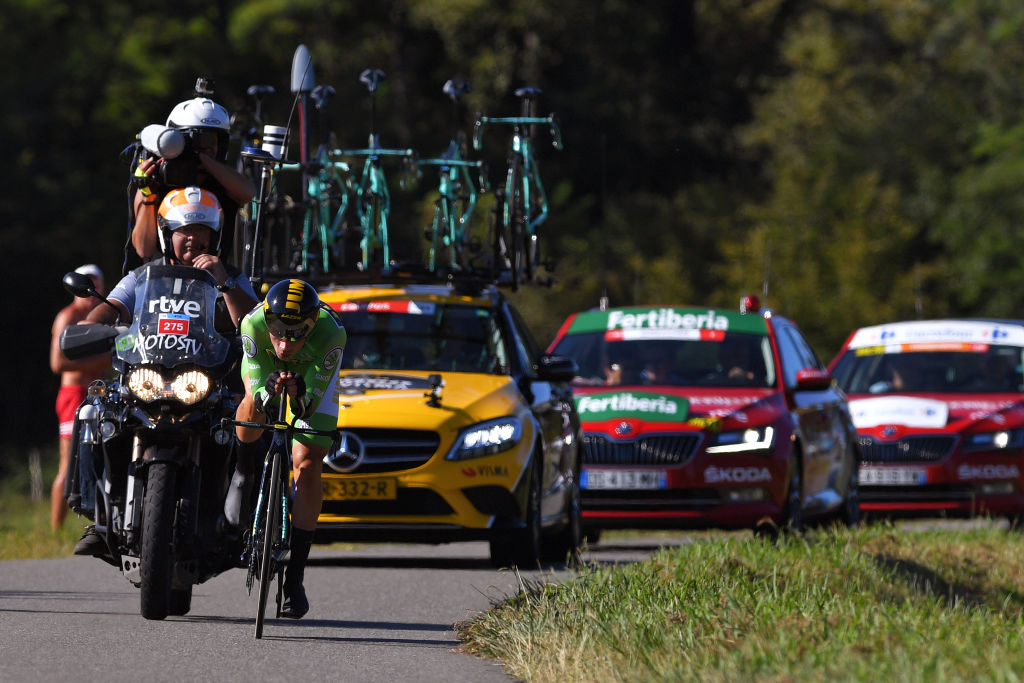
And from then on, the 2019 Vuelta belonged to Roglič. His knock-out first Vuelta stage win got here within the time trial spherical Pau, France, a rolling affair quite than venturing into the close by Pyrenees, however results-wise with the identical impact as a lone assault to a summit end. On stage 10 Slovenian not solely pushed his closest GC opponent, one Tadej Pogačar, right into a 1:30 deficit, but additionally knocked Quintana, the 2016 Vuelta winner out of the highest spot general by a mere 3:06.
Ascents as onerous because the Machuchos and the Alto de Acebo – an everyday function of the Alto de Acebo – then got here and went, nevertheless it was clear who was in command. The one actual moments of doubt got here within the type of shock setbacks within the third week: first on the featureless flatlands round Guadalajara, when Soudal-QuickStep staged a mass assault and Quintana moved as much as 2:24 general, after which when Roglič was caught up in a crash simply as Movistar have been attacking on stage 19, Nevertheless, maybe essentially the most harmful of all got here on the ultimate main ascent of the race, the Plataforma de Gredos, the place Pogačar unleashed a long-distance assault that compelled Movistar, operating second general with an growing old Alejandro Valverde, onto the defensive.
Had Pogačar’s transfer been much more profitable, it would – may – have seen him wrench the Vuelta lead from Roglič on the final. Because it was, Movistar stored a lid on Pogačar, who needed to accept taking his third stage win of the race and booting Quintana off the Vuelta podium to say third general in Madrid. In the meantime Roglič, terse and incommunicative as race chief to a degree the place one Spanish journalist snappily requested him immediately, “Are you really comfortable?” throughout a 3rd week press convention, stayed out of bother and dominated supreme all the way in which to Madrid.
As such, 2019 proved to be a Vuelta of firsts: Roglic’s first Grand Tour win, the primary ever for Slovenia, too, and the primary Grand tour podium end for Pogačar, standing because the rider to beat of the long run out with three stage victories and third general.
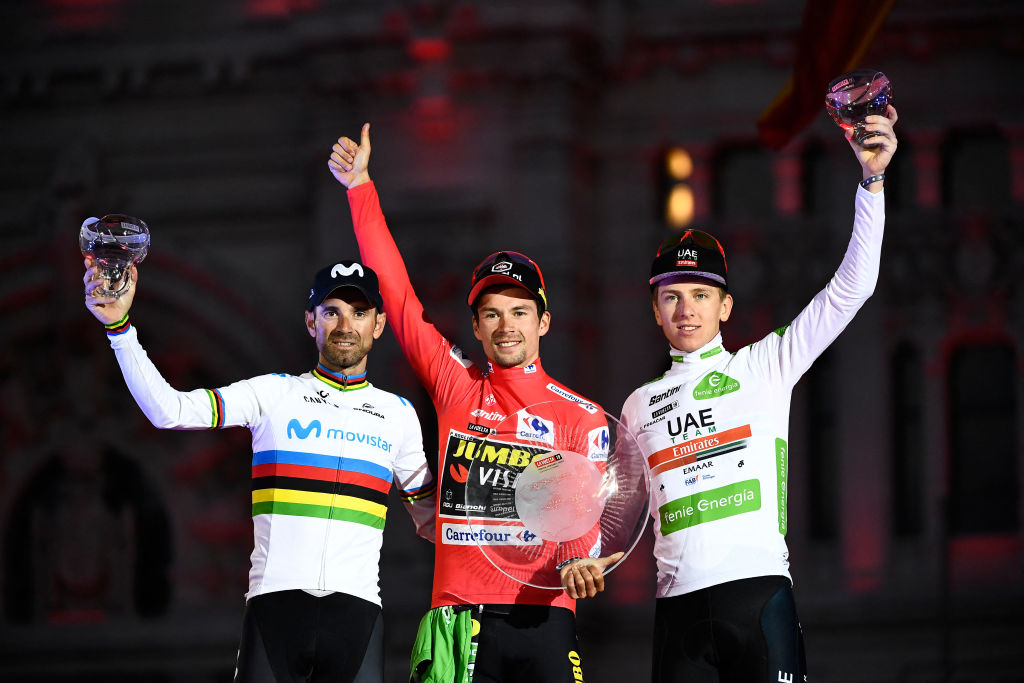
2020: The COVID-19 Vuelta a España
The pandemic might hardly be described as acquainted territory for anyone, however one of many least anticipated results was that it managed to create some massively memorable Grand Excursions. The last-minute drama started with Roglič being defeated by Pogačar within the Tour de France’s last TT and continued with Tao Geoghegan Hart seeing off Jai Hindley on the ultimate day of the Giro d’Italia. As for the Vuelta, held in a cold autumn throughout a Spain within the throes of a return to COVID-19 lockdown, the race witnessed Roglic declare his hardest fought of all three general Vuelta victories to this point.
By that time within the revamped biking calendar, following his lack of yellow within the Tour, Roglič was on the hunt for sporting revenge. In a diminished model of the Vuelta on account of worldwide COVID-19 restrictions, the race skipped three deliberate preliminary levels within the Netherlands to start out within the Basque Nation with a summit end on the legendary Mount Arrate. Roglič wasted no time in laying down a marker by sprinting to victory on the rainsoaked summit.
At that time, the Vuelta appeared like a achieved deal for a second 12 months operating. As an alternative, the rider who completed simply behind Roglič, 2019 Giro d’Italia Richard Carapaz, proved greater than in a position to give the Slovenian an actual run for his cash.
The race turned out to be an actual thriller, with Roglič and Carapaz going neck-and-neck within the subsequent summit end at Laguna Negra de Vinuesa on stage 4, just for Roglič to hit vital bother within the Pyrenean foothills on stage 6.
Caught behind after he opted to placed on a rainjacket in more and more tough climate at precisely the incorrect second, Jumbo-Visma managed to tug Roglič again to the principle pack. Consequently, on the continually undulating method roads to the lengthy, grinding last ascent to Formigal, Jumbo discovered themselves significantly depleted in numbers to again their chief. So when Carapaz and Movistar piled on the strain and break up the peloton, neither the group nor their chief Roglič, caught behind, had an actual reply.
Historical past was not in Roglič’s favour both, as he discovered himself preventing for GC survival on the identical climb the place an ambush solid by Alberto Contador wrecked Chris Froome’s probabilities of victory within the 2016 Vuelta.
This time spherical, even when he was as remoted from his teammates as Froome 5 years beforehand, Roglič was in a position to restrict the harm much better. However he nonetheless ended the day 43 seconds down on Carapaz – and out of the Vuelta lead. As Jumbo sports activities director Grischa Niermann put it together with his attribute bluntness afterwards, “We made a giant mistake. However we nonetheless have the time trial in our favour.”
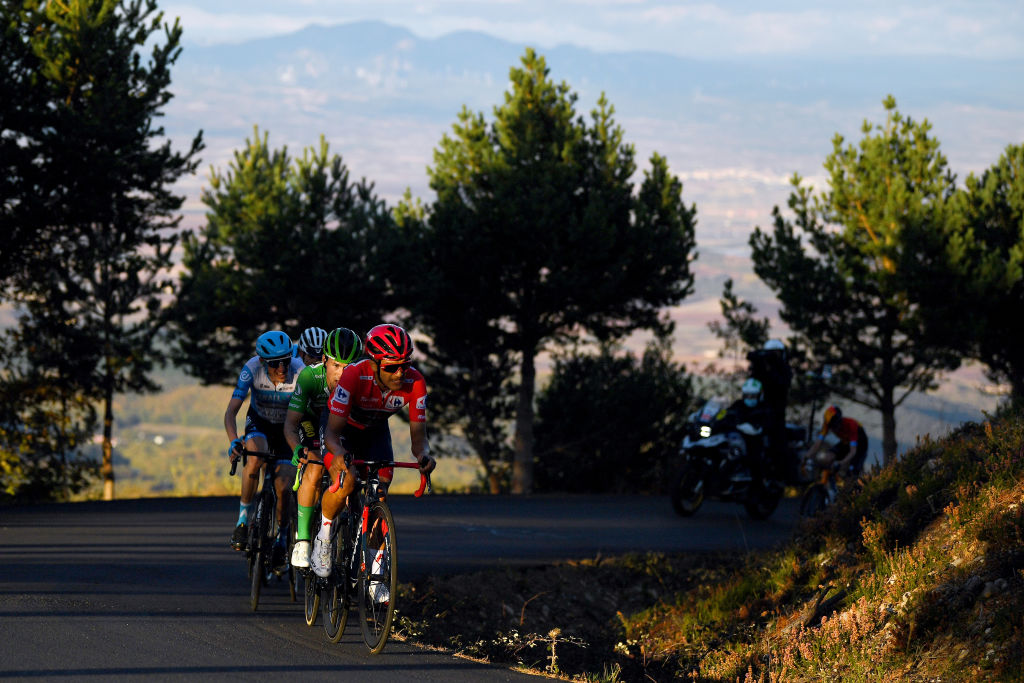
Roglič’s fightback started with a scintillating duel in opposition to Carapaz on the little-known however deeply punishing ascent of Moncalvillo in northern Spain, set to be revisited on this 12 months’s Vuelta. Then, after a sneak assault on the seemingly inoffensive uphill end to Suances gave Roglič a second 2020 Vuelta stage victory, the 2 discovered themselves tied on time on GC. Nevertheless, higher placings meant the lead teetered again into Roglič’s favour, just for Carapaz to then drop the Slovenian on the mythically steep Angliru, and return to the lead for a second time.
Neither rider appeared able to shaking off the opposite, even when the opening third week time trial, culminating in an uphill end at Ezaro in deepest rural Galicia, as soon as once more put Roglič again on prime general with a 40 second benefit on Carapaz. But that was far too slender a spot for the Slovenian to make certain of success and on the uncovered roads of the Alto de la Covatilla on stage 20, a last-minute drama got here inside a whisker of turning the tables in Carapaz’s favour for good.
Excessive on the empty, windswept plateau roads resulting in the ski station of Covatilla, the Ecuadorian launched an all-out last assault. Remoted from his group once more, Roglič in critical difficulties, solely getting some short-term respite with backing from the one Jumbo rider within the break of the day, Lennard Hofstede. However then in a unprecedented improvement, the Slovenian was in a position to lock onto the again wheel of Movistar riders Enric Mas and Marc Soler, limiting the gaps. When he crossed the road, Roglič had held onto his lead by simply 24 seconds on Carapaz, and with it, a second Vuelta a España was within the bag.
The backstory concerning Carapaz and Roglic’s sudden ‘serving to hand’ from a rival group rumbled on lengthy after Roglič had celebrated one other general win in Spain – one wherein his bonus seconds taken on levels, totalling 48 seconds performed no small half.
Then there was the entire Covatilla query: individuals have been fast to keep in mind that Carapaz’s exit from Movistar for Ineos on the finish of 2019 had been something however simple, given he was a late non-selection for the Vuelta lineup that 12 months after racing a criterium with out his group’s permission. Conspiracy theories thus abounded that he had been ‘punished’ by Movistar on the Covatilla, though officialy the group stated their riders had been unaware that Roglič was on their wheel on stage 20.
Regardless of the fact such rumours actually held, Roglič had his title within the document books. He not solely grew to become the primary rider to take two consecutive Vueltas since Roberto Heras (coincidentally from the city of Bejar on the foot of the Covatilla) took three in a row between 2003 and 2005. For the second 12 months operating, Roglič was additionally the one rider to safe podium finishes in two Grand Excursions, and, after his Liège-Bastogne-Liège win, the primary to take a Grand Tour and Monument in the identical 12 months since Laurent Jalabert gained the Vuelta and Milan-San Remo in 1995.
Roglič’s second Vuelta was additionally, regrettably, particular as a result of it was a race with – and in opposition to – the pandemic. Though no riders examined constructive within the Vuelta itself, COVID-19 was all the time been a troubling, fixed presence, proper all the way down to the restrictions and confinements throughout Spain, and, in fact, the dearth of public on the large climbs. However lastly, the Vuelta made it via.
“Getting this race to the end is an achievement for each one in all us. Every little thing went effectively. Every little thing labored,” Roglič stated afterwards. “A giant because of the organisation and everyone concerned who made this potential. We are able to see on the planet it’s a extremely unhealthy scenario however we nonetheless might do some racing and possibly produce some constructive information on the finish of the day.”
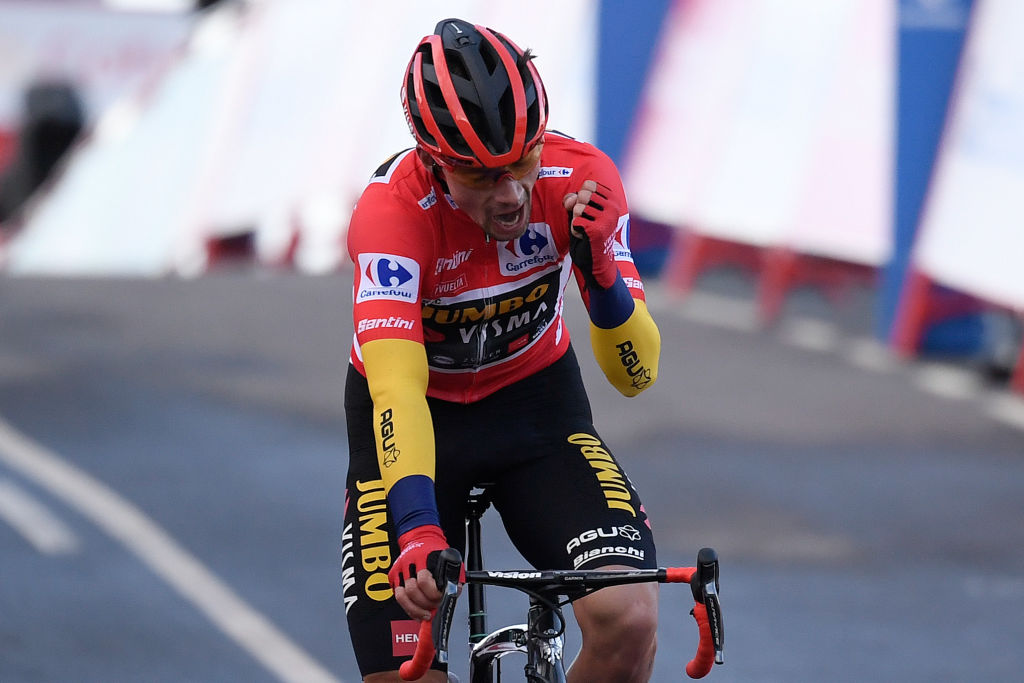
2021: Simpler than ever
After all of the nailbitingly shut racing of 2020, Roglič’s third and most up-to-date Vuelta a España victory was by far his most simple. A triumph within the opening time trial in entrance of Burgos cathedral meant that for the second 12 months operating, he began the Vuelta in the identical approach that he had ended the earlier one – within the lead. From there, Roglič’s place merely acquired stronger and stronger.
Having briefly ‘loaned’ out the chief’s jersey to Rein Taaramae and, after a large late crash, Kenny Elissonde within the first week, Roglič’s gorgeous ascent of the brutally steep ascent to Cullera in jap Valencia allowed him to regain la roja as soon as extra. Second place on the interminable slopes of Velefique within the deserts of south-east Spain boosted his lead somewhat additional, however the place Roglič actually started to crowbar the race in his favour was on a seemingly inoffensive cat. 2 climb on the opening stage of the second week.
Letting a big break up the highway of non-GC threats ensured that he can be out of purple, and irksome post-stage podium and media obligations for at the least so far as the mountains of northern Spain. Concurrently he was enjoying one very predictable sport, Roglič concurrently tore up the script by attacking close to the summit of the cat 2 Almachar climb and soloing away down the treacherous roads to the coastal end city of Rincón de la Victoria.
Whereas a crash midway down the greasy, spiralling descent might have spelled curtains for Roglič’s GC bid, fortunately he might rapidly remount and proceed unscathed. The following delay did imply Movistar GC duo Enric Mas and Miguel Angel Lopez might regain contact. However there was no such risk of getting again within the sport for Ineos challengers Egan Bernal and Adam Yates, already too far distanced when Roglič attacked. However greater than the gaps what mattered above all, was the convenience with which Roglič had extracted himself from the sector in such unpromising terrain: face with such superiority, there was little hope for the remaining.
The methods wherein Roglič then alternated between demolishing the opposition and maintaining them firmly beneath his thumb on every key stage continued to be as various because it was entertaining – at the least for the followers. There was his finely calculated outpowering of Enric Mas for a stage win on the ‘side-of-the-house’ end at Valdepeñas de Jaén, Spain’s equal of the Mur de Huy.
Then there was the informal crushing of a transfer by the firebrand Miguel Angel Lopez at Pico Villuercas via the sierras de Guadalupe on stage 14 and the equally uneventful snuffing out of repeated digs by Adam Yates en path to El Barraco within the Sierras of Ávila on stage 15. There was his decided late cost at stage 18 to El Gamoniteuru in Asturias to knock out a couple of extra seconds on all bar López. Then at the same time as Lopez was seemingly in search of essentially the most dramatic abandon from the race potential on stage 20, Roglič made the identical final kilometre transfer once more.
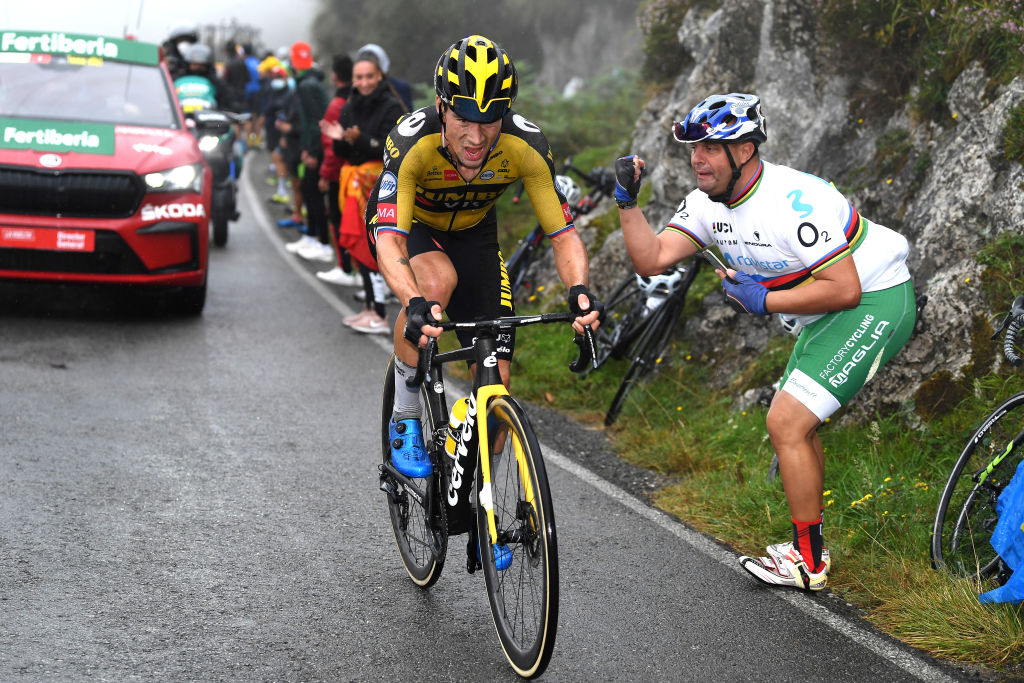
However the stage that confirmed what was already a digital certainty got here on essentially the most emblematic climb of the complete Vuelta, to Lagos de Covadonga. After opting to comply with a courageous transfer Egan Bernal (Ineos Grenadiers) some 60 kilometres out, Roglič then shed the Colombian from his again wheel half approach up the ultimate ascent to go solo to the end. Biking legend all the time had it that whoever was within the Vuelta lead by the summit of Covadonga – a end deep within the Picos de Europa, and residential, too, to among the final wolves in western Europe – can be in purple come the general end of the Vuelta, too. And in Roglič’s case, as he returned to the lead he had ‘loaned’ to the then Intermarché-Wanty-Gobert racer Christian Odd Eiking per week earlier than, the legend appeared all however sure to turn out to be actuality, once more, significantly as a sure Sepp Kuss, then his teammate, positioned second that day, 1:35 again.
Put merely, the opposition had been flattened as soon as once more. By the point the race reached Santiago de Compostela 5 days later, Roglič was greater than residence free in his bid for a 3rd Vuelta a España win. He wrapped it up with a last time trial victory within the streets of the Galician capital too, ending the 2021 Vuelta precisely because it had started, with one other TT win in entrance of a cathedral and with Roglič in purple once more.
Whereas his last victory margin of 4:42 over Mas was the biggest, too, in 24 years since Alex Zulle completed greater than 5 minutes forward of Fernando Escartin in 1997, by this level Roglič was racing in opposition to the historical past books. Victory quantity three meant he joined Tony Rominger, Alberto Contador and Robert Heras to overcome the Spanish Grand Tour as triple winners of the race.
“Hopefully the older you might be, the happier you might be,” he joked to reporters. “And I like this race, it offers me lovely reminiscences that I’ll have for my complete life.”
Fairly aside from the statistics, what was equally spectacular was that the Vuelta 2021 was one more comeback after a serious blow within the Tour de France. Whereas 2020 had been largely to do with overcoming the psychological impression of shedding biking’s largest race within the final potential day, a 12 months later the Vuelta was extra about recovering from the bodily fallout of a foul crash and subsequent accidents within the Tour. Both approach, the ultimate consequence was the identical: Roglič was there, again in purple once more, within the Vuelta España
No sooner did he appear to be ready to dominate the Vuelta for so long as h happy than issues turned awry. The 2022 Vuelta, although, couldn’t have ended extra in a different way for Roglič, culminating in a freak crash on the end of a transition stage within the third week. Then in 2023, group techniques and an outstanding efficiency by Sepp Kuss prevented him as soon as once more from opting to attempt for a fourth record-equalling title.
What the 2024 Vuelta will deliver for Roglič – and his rivals – very a lot stays to be seen. However no matter occurs, his journey from that barstool someplace in an nameless classroom someplace in south-east Spain again in August 2019 will stay nothing lower than outstanding – and a key a part of Vuelta a España historical past.
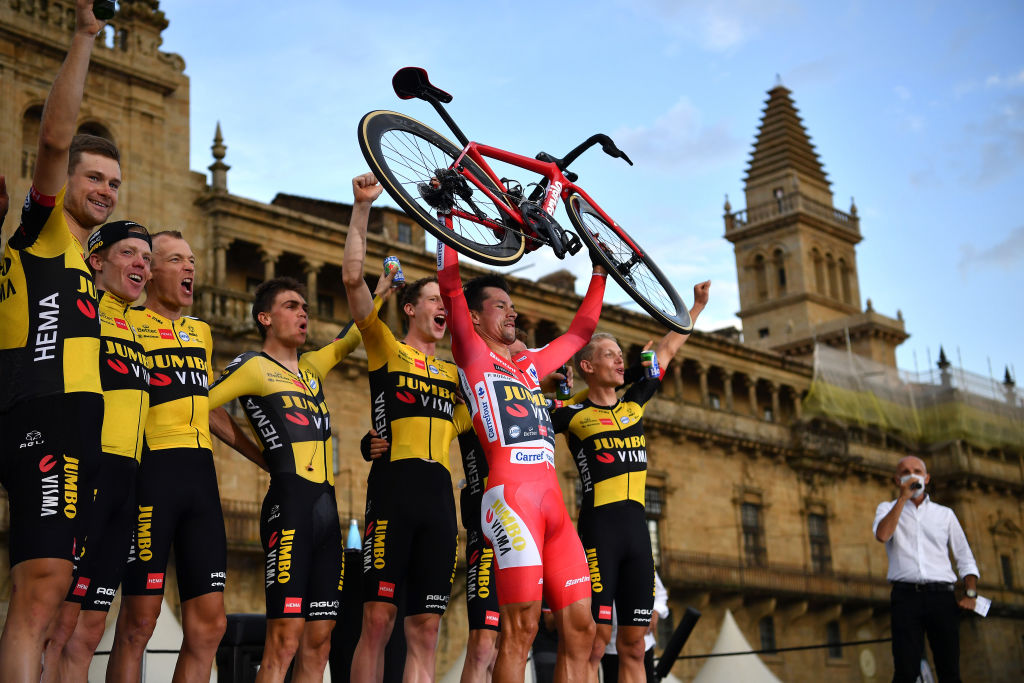
Get limitless entry to all of our protection of the 2024 Vuelta a España – together with breaking information and evaluation reported by our journalists on the bottom from each stage because it occurs and extra. Discover out extra.

